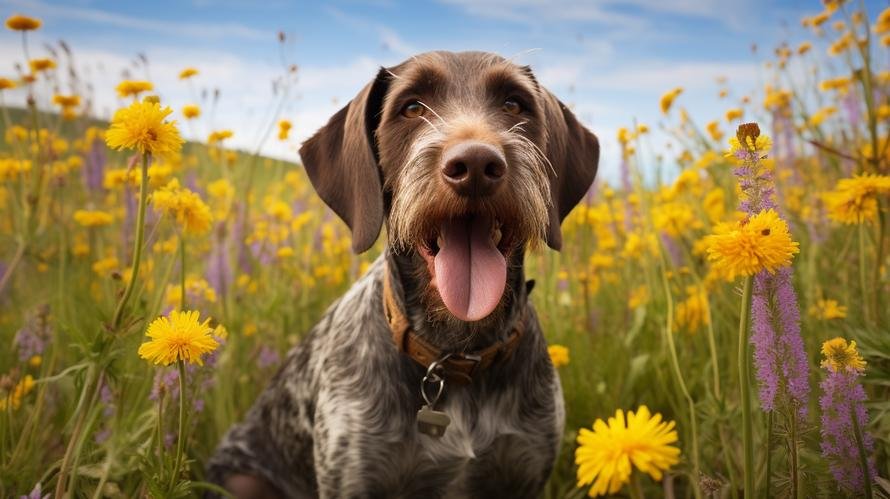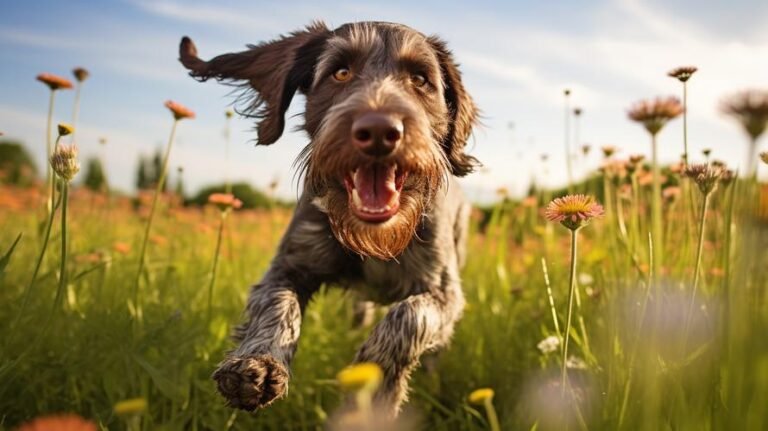Imagine your German Wirehaired Pointer springing up from a nap, full of vim and vigor, leaping—and yes, sometimes even flying—over your backyard’s grassy hills. These agile dogs love an active lifestyle, whether it’s running down hiking trails, chasing Frisbees in the park, or participating in field events. What is their secret to such tireless and energetic behavior? It’s the food you feed them!
The way you fuel your German Wirehaired Pointer directly impacts not just their activity levels, but also their overall health, longevity, and well-being. But what is the most suitable diet for these strong and sporty pets? Let us unravel this mystery together.
German Wirehaired Pointers, affectionately known as GWP or Drahthaars, belong to an intelligent, versatile, and robust breed, originally developed in Germany as a hunting dog. These resilient dogs are known for their distinctive, wiry coats, and their protective, yet playful nature. They are tirelessly energetic and require high-quality nutrition to match their spirited personality.
Before we dive deep into the best food for German Wirehaired Pointers, let’s briefly understand their nutritional requirements. GWPs, being a medium to large breed, require balanced nutrition, which comprises the right amount of proteins, carbohydrates, fats, vitamins, and minerals. However, not all GWPs are the same. Their nutritional requirements can change based on their age, size, activity level, and overall health.
PUPPY STAGE: During the puppy stage, German Wirehaired Pointers are a bundle of energy. They require high levels of protein to support their rapid growth and development. Foods rich in DHA (Docosahexaenoic Acid), a crucial Omega-3 fatty acid, are recommended for puppies as they support brain and vision development.
ADULTHOOD: As your GWP transitions into adulthood, their diet should be adjusted accordingly. High-quality proteins should still make up a good chunk of their diet, but they’ll need fewer calories than their puppy counterparts. Foods with a balance of proteins, fats, and carbohydrates provide your adult GWP the energy he needs while helping him maintain a healthy weight.
SENIOR YEARS: In their senior years, GWPs may experience a decrease in activity levels. A diet lower in calories but still rich in high-quality proteins is essential to keep them in peak condition. Foods with joint-healthy nutrients such as Glucosamine and Chondroitin can be beneficial for older German Wirehaired Pointers.
Beyond these stages, factors like weight, metabolism, and overall activity should influence the kind of food to serve. For instance, a sporty GWP competing in field events may require more calories than your average family pet. Food with high protein content, dense in calories like lean meats, should be their main meal.
If your GWP struggles with obesity, balance their diet with low-fat, high-fiber foods. You could also consider foods with L-Carnitine, a nutrient that helps turn fat into energy, helping your dog to maintain a healthy weight.
Just as with us humans, German Wirehaired Pointers require a variety of foods to meet their nutritional needs. A one-size-fits-all approach doesn’t work here. Here’s a tip: rotate foods to ensure a nutrient-rich diet. This could mean alternating between chicken, beef, lamb, or fish-based diets or switching between dried, wet, and raw foods.
Speaking of variety, let’s delve into a much-debated topic in the pet food world – dry food vs. wet food. Dry food, also known as kibble, is widely favored for its convenience and long shelf-life. It’s also instrumental in keeping the dog’s teeth clean. Wet food, on the other hand, is often more palatable and contains more moisture, which can be helpful for dogs that don’t drink enough water. As a result, a combination of both can be an excellent choice for your GWP.
Lastly, many owners wonder if a raw or ‘Barf’ diet – biologically appropriate raw food – is right for their dog. There is no definitive answer as the ‘Barf’ diet has its supporters who swear by its benefits and its detractors who warn of risks. If you opt for it, remember that it should be well-balanced, and meat should always be fresh.
In conclusion, the best food for a German Wirehaired Pointer is one that meets their nutritional needs keeping in mind their age, size, activity level, and health situation. Whether it’s dry kibble, wet food, raw diet, or a mix, make sure the diet includes a perfect balance of proteins, carbohydrates, fats, vitamins, and minerals. Always consult with your veterinarian before changing your GWP’s diet or starting them on a new feeding regime. Because at the end of the day, what matters is that your German Wirehaired Pointer is happy, healthy and ready for that next big leap – or flying adventure – in your backyard.



